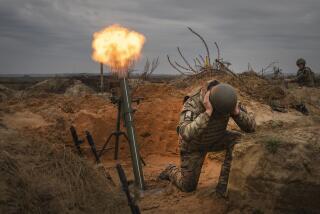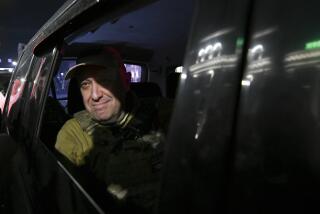Qatar Car Blast Kills Chechen Separatist
- Share via
MOSCOW — An exiled separatist leader accused by Moscow of being a key link in financing rebels in the war-torn Russian republic of Chechnya died Friday after a bomb blasted his car, authorities said.
Zelimkhan Yandarbiyev, a leader of Chechen rebels from 1996 to 1997, died en route to a hospital after the explosion in the Persian Gulf nation of Qatar, the Arab satellite TV channel Al Jazeera reported. His 13-year-old son was critically injured. The pair had just left Friday prayers at a mosque when the blast occurred, according to reports from Qatar.
Moscow had been seeking extradition of the 51-year-old separatist leader, whom it accused of having ties to the Al Qaeda terrorist network. His death came one week after a bomb on the Moscow subway killed 41 people and injured more than 100 in an attack authorities blamed on Chechen separatists.
Russia’s Foreign Intelligence Service, one of the successor agencies to the Soviet-era KGB, quickly denied responsibility for the assassination.
Chechens exercised self-rule in their Caucasus republic after defeating Russian troops in a 1994-96 war. Russian forces returned in 1999 and have fought guerrillas since.
The killing left participants in the Chechen struggle and observers speculating about who was to blame.
Pro-Moscow Chechen President Akhmad Kadyrov told the Russian news agency Interfax that Yandarbiyev was among those most at fault for the violence that Chechnya has endured over the last decade.
“Yandarbiyev was the main ideologist of the separatists and later of the terrorist organizations who drove Chechnya to such grave consequences. He is to blame for everything that is going on,” Kadyrov said. “There will be no people in the Chechen republic who are too sorry.”
Speaking on Russian state television, Kadyrov suggested that the killing resulted from rebel infighting over money. “They are settling scores with each other,” he said. “They cannot decide how to divide the money which is donated by people who think they are donating to help the Chechen people. Yandarbiyev was one such money collector.”
Chechen Deputy Prime Minister Adlan Magomadov told Russia’s Itar-Tass news service that authorities believed Yandarbiyev received funds from “extremist organizations” but transferred only a small portion to Chechnya. The portion that the separatist leader did send, Magomadov said, went to radical guerrilla leader Shamil Basayev, offending more moderate rivals such as former Chechen President Aslan Maskhadov.
Some observers, however, still suspected Russian intelligence.
“There is almost no doubt that Zelimkhan Yandarbiyev was destroyed today by Russian secret services,” said Vyacheslav Izmailov, an analyst with the Novaya Gazeta newspaper who is one of the nation’s leading specialists on Chechnya. “Their position is quite explicable. They cannot admit being involved in blowing up people on the territory of foreign countries.”
The analyst said he believed that the killing was in part intended to send a message that separatist leaders “should not ever feel safe no matter which country they prefer to hide in.”
“It may take a long time, but once on the death list, these people will be tracked down and eventually destroyed,” he said.
A nationalist poet and children’s author, Yandarbiyev became acting president of the self-declared independent republic in 1996 after his predecessor was killed by a Russian missile while talking on a satellite telephone. Reports soon after that death described it as an assassination by the Russians using weapons guided to the spot by the phone’s signals.
Yandarbiyev then headed peace talks between Chechen separatists and then-Russian President Boris N. Yeltsin, which led to a temporary Russian withdrawal and three years of de facto independence. He also was a prominent proponent of radical Islam.
Both the United Nations and the United States included him on lists of international terrorists subject to financial and other sanctions. He was believed to have been living in Qatar for at least three years.
Russian authorities suspected him of links to the 2002 seizure of a Moscow theater by Chechen rebels.
The standoff ended with the deaths of 129 hostages, nearly all from a gas used by security forces who stormed the building, and all 41 hostage takers, many of whom were shot.
Alexei V. Kuznetsov of The Times’ Moscow Bureau contributed to this report.
More to Read
Sign up for Essential California
The most important California stories and recommendations in your inbox every morning.
You may occasionally receive promotional content from the Los Angeles Times.












